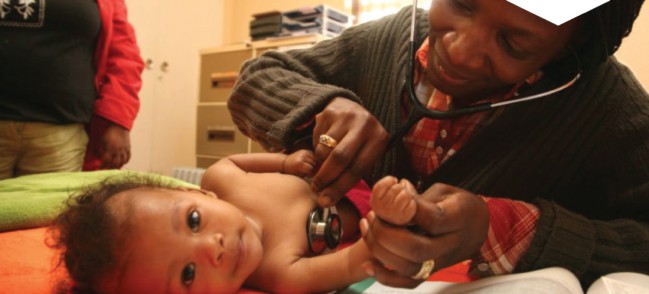UCT’s reputation for research excellence was endorsed with news in 2013 that the university attracted more funding for direct grants from the National Institutes of Health (NIH) than any other university in the world outside the USA. The NIH, the USA’s medical research agency, is the largest source of medical funding in the world.
These research grants, which amount to more than US$9 million, make it possible for UCT’s researchers to tackle some of Africa’s most intractable health problems, such as HIV, TB and malnutrition. Most of the projects are large in scale and many involve collaboration with partner universities elsewhere in Africa. The funding may come from the USA, but one of its most significant impacts is building capacity in Africa to address its own health problems.
Unravelling the mysteries of sickle cell anaemia
Associate Professor Ambroise Wonkam, senior specialist in the Division of Human Genetics in the Faculty of Health Sciences, runs one such project focusing on sickle cell anaemia. “Seventy percent of those with the disease were born in Africa, yet 70% of what we know about it was discovered outside Africa,“ says Associate Professor Wonkam. “We in Africa have to solve these problems ourselves: it is our duty.”
The immediate goal of Associate Professor Wonkam’s project is to find out why some patients get sicker than others, despite having the same gene malformation. He and his colleagues are looking for variations in other parts of the genome: this will help determine which patients have the disease from birth, enabling early interventions, and may lead to developing a drug to treat it.
Schizophrenia in the Xhosa population
Professor Dan Stein, head of the Department of Psychiatry and Mental Health, is leading a project on the genetics of schizophrenia in the Xhosa population of South Africa. Professor Stein says, “This project will be the first to use modern genomic sequencing approaches to study schizophrenia in a population of Sub-Saharan African lineage. If successful, our approach will identify genes important for the disorder in populations worldwide … and help develop more effective treatment and prevention strategies.”
HIV: eliminating mother-to-child transmission
Dr Mary-Ann Davies, senior researcher at the Centre for Infectious Disease Epidemiology and Research (CIDER), is looking at closing the gaps in prevention of mother-to-child transmission of HIV coverage, early infant diagnosis and treatment. “Virtual elimination of transmission of HIV from mothers to their babies is within reach in South Africa. Despite high levels of HIV among pregnant mothers, transmission to their babies has been reduced to less than 2%,” says Dr Davies. If there were no interventions, the figure would be closer to 30%, so the programme has been hugely successful. “Yet, elimination remains elusive, with up to 1 000 infants still acquiring HIV in the Western Cape each year.”
High-calibre research
It is the calibre of the scientists leading these projects at UCT that is part of the secret to South Africa’s outstanding success in attracting grants from the NIH. The NIH have said that scientific quality is one of the main reasons why so many of its funded projects are located in South Africa.
“They fund based on excellence,” says Associate Professor Nicola Mulder, head of the Computational Biology Group that receives NIH funding for bioinformatics. “It is an equal, peer-reviewed process, in which reviewers score the proposals based on scientific excellence.”



Comments are closed.